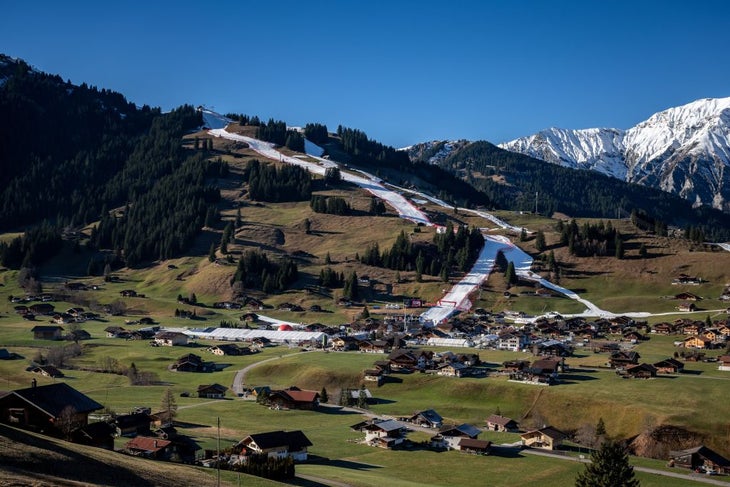Products You May Like
Get full access to Outside Learn, our online education hub featuring in-depth fitness, nutrition, and adventure courses and more than 2,000 instructional videos when you sign up for Outside+
Sign up for Outside+ today.
On February 14, 2023, nearly 300 athletes issued a letter to the International Ski Federation (FIS), demanding the global governing body take serious action against climate change to ensure a future for winter sports.
U.S. athletes Mikaela Shiffrin, Travis Ganong, and Jessie Diggins, along with international racing stars like Aleksander Aamodt Kilde (Norway) and Federica Brignone (Italy,) are among hundreds of FIS athletes who signed their names to “Our sport is endangered,” written by Austrian alpine skier and Protect Our Winters Ambassador Julian Schütter. The letter, which centers on the viability of the alpine World Cup season, calls into question FIS’ current sustainability efforts, or lack thereof, citing them as “insufficient” in the face of existential threat.
“Public opinion about skiing is shifting towards unjustifiability,” wrote Schütter. “This will also bring the industry into trouble. That’s why we as a winter sports community must take the lead in the fight against climate change and make our sports climate neutral as soon as possible.”
In defense of their claims, the athletes’ letter outlined how climate change has already had a significant impact on winter sports, particularly alpine skiing.

More competitions have been canceled in recent years than ever before due to extreme weather and lack of snow, particularly in October and early November when the ski racing season traditionally kicks off. The 2023 January heatwave in Europe threatened classic World Cup venues’ ability to host races as winter temperatures rose to far above average at low-altitude ski resorts. And as glaciers around the globe shrink, fewer options are available for off-season training in preparation for the World Cup season.
On top of changing conditions and a growing reliance on artificial snow, athletes question FIS’ scheduling decisions as they contribute to carbon emissions.
Nations competing in the men’s alpine World Cup circuit, for example, will make the trip to Palisades Tahoe, Calif., from the European Alps for a short tech series over the weekend of Feb.25-26, traveling over 5,000 miles from the World Championships venue in Courchevel-Meribel, France, they competed at just weeks before. The following weekend, Aspen Snowmass in Colorado will host the men’s speed circuit for a downhill and super-G race, just months after the United States hosted a speed series at Beaver Creek, Colo., a resort about 30 miles northeast, as the crow flies.
Related: 2023 World Cup schedule includes four U.S. stops spread throughout the season
According to the athlete’s letter, scheduling these races one after the other would have reduced the tour’s carbon emissions by approximately 1,500 tons.
The asks of the athletes are simple. Commit to a sustainability strategy that aims for net-zero emissions by 2035 or prior and reduces emissions by 50 percent by 2030, backed by a sustainability department that oversees the plan’s execution and holds FIS officials accountable.
The letter goes as far as to list practical solutions FIS could employ to reach these goals, including shifting the season’s schedule from October to March to November to April to better align with changing weather patterns, reconsidering race venues to reduce travel, using their political stature to influence government policy, encouraging national federations to take internal action, and more.
“It’s about time to address a really important topic,” Kilde commented after winning a silver medal in the World Championships downhill on Sunday in France, which has experienced historic low snowpack this season. “We see that the world is changing. We also see the impact on our sport. I want the future generations to experience winter and to be able to do what I do.”
At the time of writing, 57 athletes from the United States have shown their support, including Paula Moltzan, Breezy Johnson, River Radamus, Tommy Ford, Alice Merryweather, Bella Wright, Kyle Negomir, Jett Seymour, and Katie Hensien, in addition to Shiffrin and Ganong.
At this time, the letter remains open to FIS athletes competing on an international level, with no comment from FIS.
Join SKI and the Outside family in the fight against climate change by supporting Protect Our Winters.
